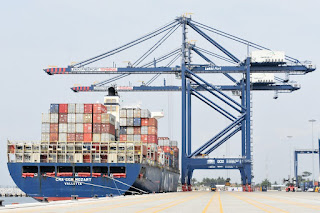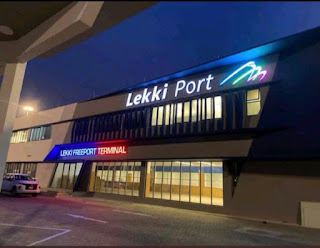As commercial operation gathered momentum at the lekki Deep Seaport, the lekki Freeport Terminal said four commercial vessels have so far berthed and discharged cargoes successfully at the port.
Speaking over the weekend to LEADERSHIP, the chief commercial officer, LFT, Kehinde Olubi-Neye, disclosed that the port has been receiving import volumes and export of empty containers since commercial operation started.
According
to him, though the import volumes are still low, there are hope of
commercial operation picking up fully in few days to come.
“We
have been having volumes of import discharges, we have been having
export of empty containers and we will start exporting fully laden
export containers in no near future. The volume is low at this point and
it takes a while for this things to materialise.
“Vessels are
already on services as at today and most shipping lines run weekly
service and their booking plans they have commitment towards delivering
cargoes to specific ports as seen on their bill of laden and it takes
time for that to switch,” he said.
He further disclosed that over $100million has been invested in cargo and terminal handling equipment.
Olubi-Neye, said the port
has the needed equipment and the draft to recover transship cargo bound
for landlocked neighbouring countries back into the country.
“The lekki
Freeport Terminal has discussed with stakeholders including Nigeria
Customs Service and that they are confident that recovering
transshipment cargo not just for the hinterland but also for landlocked
countries and other regional countries will be back in the country,” he
said.
However, he said the port
has also seen the opportunity to play a role in the uptake of cargo in
the Eastern Ports, which is why they are currently having discussions on
moving containers discharged at lekki port by barge to the Eastern Ports of Calabar, Warri, and Onitsha River port among others to help increase the economy of those ports.
On cargo evacuation from the port, he added that the lekki port
operates an automated system that is linked to the automated gate with
the vehicle booking system where truck drivers are required to book
appointments in advance.
He said, “This also supports the
initiative of the Lagos State Government with regards to the
comprehensive call-up system for the Lagos Free Zone, lekki port, Dangote Free Zone, Dangote Refinery and the Pinnacle Oil and Gas.’’
“We
are in active discussions with the Lagos State Ministry of Transport
and other stakeholders on the deployment of the call-up system for the lekki
area and we have confidence that the coming onboard of the call-up
system for trucks will address any concerns that prospective port users would have over access to the port,” he said.
Beyond the road, he said that lekki port
is also exploring the possibility of moving cargo by barges and has
been able to execute more than five barge moves of over 900 twenty-foot
equivalent units of containers (TEUs) from lekki port to the Ikorodu area of Lagos.
He further hinted that the port has completed a truck park very close to the port that has capacity to accommodate 150 trucks.
He
commended the efforts of the Federal Government and Lagos State
Government in constructing the roads, which he said has improved
significantly.
On his part, the Managing Director of the
Nigerian Ports Authority (NPA), Mohammed Bello-Koko, who was represented
by Ikechukwu Onyemakara, described lekki port
as Nigerian project and assured that the NPA would do everything within
it powers to grant necessary approvals and to provide marine services
to the port.
Earlier, the Chief Executive Officer of lekki Freeport Terminal, Yann Magarian, said the lekki port would shape the maritime economy of the country and called on Nigerians to embrace and promote the port.
He disclosed that the port
is fully automated to eliminate human contacts and well equipped as
some of the equipment seen in the terminal especially the ship-to-shore
crane at the port is mostly seen in big ports in Dubai and Singapore.
He added that the lekki port can do a lot for Nigeria in terms of generating revenue worth billions of dollars and create thousands of jobs for Nigerians.






